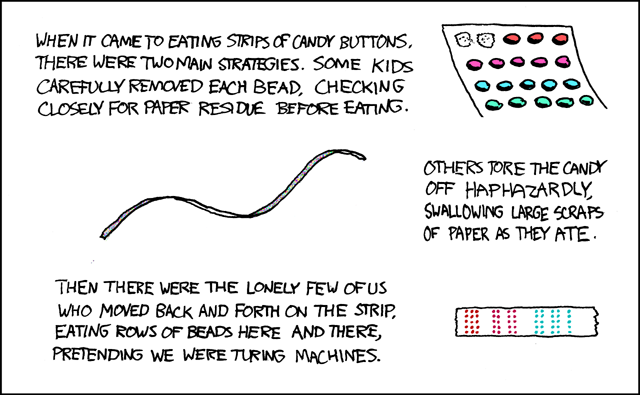|
Last Update: Thursday, 18 February 2021
Note: |
|
Last Update: Thursday, 18 February 2021
Note: |

Articles on the Nature of Algorithms
"What is the difference between a Turing machine and the modern
computer? It's the same as that between Hillary's ascent of Everest and
the establishment of a Hilton hotel on its peak."
—Alan Perlis
Petzold, Charles (2008),
The
Annotated
Turing:
A Guided Tour through Alan Turing's Historic Paper on Computability and
the Turing Machine (Indianpolis: Wiley).
Davis, Martin (2008),
"Touring Turing" (review of Petzold 2008),
American Scientist
96(6) (November-December): 520.
Dresner, Eli (2003),
"Effective Memory and Turing's Model of Mind",
Journal of Experimental & Theoretical Artificial Intelligence
15(1): 113–123.

Alternatively, download that .rtfd directory; it contains
two files, TXT.rtf, which contains the text of the obit,
and unknown.jpg, which contains a photo of Henkin.
Abstract:
This paper contains a proof that every program
with gotos can be transformed into a semantically equivalent
program without goto. A transformation algorithm is given.
Raskin, Jef
(2003),
Letter to the Editor about "Life beyond OOP",
American Scientist
91 (May-June): 197-198.
Editor:
We are making this communication intentionally short to leave
as much room as possible for the answers.
T. WANGSNESS
J. FRANKLIN
TRW Systems
Redondo Beach, California
The published answers:
Sieg, Wilfried,
&
Byrnes, John
(1999),
"An Abstract Model for Parallel Computation:
Gandy's Thesis",
The
Monist
82(1) (January):
150-164.
Contents:
Soare, Robert I.
(1999),
"The
History and Concept of Computability" [PDF],
in E.R. Griffor (ed.), Handbook of Computability Theory
(Amsterdam: Elsevier): 3-36.
Shapiro, Stuart C. (1977), "Representing Numbers in Semantic Networks:
Prolegomena",
in Proceedings of the 5th International Joint Conference on Artificial
Intelligence (Los Altos, CA: Morgan Kaufmann): 284.
What is a heuristic?
Anthony Ralston & Edwin D. Reilly (eds.),
Encyclopedia of Computer Science, 3rd Edition,
(New York: Van Nostrand Reinhold, 1993): 87-90.
Text copyright © 2004–2021 by William J. Rapaport
(rapaport@buffalo.edu)
Cartoon links and screen-captures appear here for your enjoyment.
They are not meant to infringe on any copyrights held by the creators.
For more information on any cartoon, click on it, or contact me.
http://www.cse.buffalo.edu/~rapaport/584/whatisanalg.html-20210218